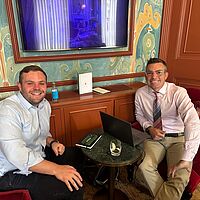These three candidates will give you a detailed insight into what type of employer they are after, in hopes to land a top graduate job. Being part of our Rising Stars scheme means that you are the top candidates in our pool, so hear what Tamia, Juan, and Uma have to say about their expectations.
Please introduce yourselves!
Tamia: I'm studying English language and linguistics at the University of Birmingham currently in my final year alongside my degree, I also work as a student ambassador and student representative at my university, and I have plans to study a graduate conversion course in law next year at BPP university.
Juan: I come from Chile and I'm doing a Master’s in business analytics. I come from an engineering background and then went into consulting, other than that, I'm generally a sports enthusiast. I've tried every sport from rugby, to triathlon, and it's a diversity I like to take into all my skill learning
Uma: I'm also in my final year studying History and English at the University of Oxford. When I'm not studying, I'm also a massive sports fan. I've been rowing with my college for a while and I also love netball and football. I also enjoy student journalism, I've been work writing as a columnist for one of the student newspapers which I've been really enjoying.
Q1. How have you been through the last year as we come out of the pandemic? How have you been coping with university?
Tamia: I think I've just really adapted to online work and at first it was quite difficult, but I think now I find it much easier especially after completing two online internships, I think that's also helped me to work better online and now I actually quite like it in comparison to in-person. I like the mixture now that I can work online and also in-person and I've been able to adapt because of covid.
Juan: This has been one of the most particular years because every time we think we're getting out then we got some level of lockdown or setback. It's been a lot about resilience, but to me the best part, especially coming to study to another country, has been that I feel there's some sort of eagerness from people to interact with another. I’m a big people person and I can sense that everyone's so eager for human interaction.
Uma: It's been such a relief to have things finally opening up, I suppose especially in the university setting when so many sports societies are based around being able to see people, and even teaching is just a whole different type of experience when you're actually able to have those intellectual discussions and see people in a face-to-face a setting.
Q2. What would you be looking for in an employer? What are your expectations of your next role?
Tamia: I think for an employer I look for the opportunity to push barriers and look potentially up with mobility, so, ideally, I'm looking for an employer that will enable me to be able to push my boundaries and to develop and end up in a more enhanced role. I don't want to be in a company where I'm sitting in the same position for years, I want to have that ability to push forward and have something to be excited about and develop myself. I'm also looking for a company with good culture, with nice people, somewhere I feel comfortable and somewhere I'm excited to go to work. I know a lot of people who are always complaining about their jobs and I feel like I want something that's exciting t that's going to keep pushing me and keep challenging me and allow me to enjoy my job.
Juan: For me, one of the most important things in a company is feeling that the job I do has an impact, whether within the company or within people in general. I want to feel that what I’m doing matters, that's what’s going to keep me going, I'm a very driven person. On the other hand, the second most important thing is the people you work with, as Tamia said, that the culture is so important. I think inevitably there's going to be some times where you're going to have to work extra or put in a little bit more; but you're not going to do it for just a pay check and you're not going to do it for a nameless company; you're going to do it for the people you have around you, and I think that can motivate you to do a little bit extra to support a team.
Uma: I'd echo everything that's been said already, but I think also coming out of the last few years, all we hear about is working from home. I think something that I find really important is the opportunity to be able to, not only go into a workplace and interact with people but also be able to travel to work. I think discovering different locations, personally, I'd love the opportunity to be able to work abroad in different parts of the country. Just to feel like my job is allowing me to discover different places whilst allowing me to discover more about myself.
Q3. Let’s talk about red flags! What would stop you from going forward with a company? What would put you off?
Tamia: One of the main things that will put me off is a lack of diversity. I'd rather be in a company where they care about diversity especially, and where they look to enhance their company. For example, there have been companies that have looked into 10,000 black interns, where they've noticed that their company lacks in diversity, but they were looking for ways to change that and I think that is one of the most important things for me: The company that's forever looking to change and acknowledges where they're going wrong, that's really important for me.
Juan: The earliest red flag is a company that does not value your time and when they don't let you know that they're not going to be able to make it to the interview or you show up and you see that there's no real interest. I think if you don't value my time there's a lot of me that you're not going to value. On the other hand, something that's very important for me, again as a people person, is a company that harnesses collaboration, I don't want to be pinned against my co-workers, I want us all to grow as a pack. If I see that a company is not valuing collaboration or not harnessing that environment then that's somewhere I probably don't want to be.
Uma: As I said before, I think some somewhere that feels really static, I would really want to feel like there's a trajectory for me to go up against. I like feeling a bit of pressure and that there's something to work towards because, otherwise, if you go in every day and you feel like you're doing the same thing with no end in sight, I think that could possibly become quite demotivating.
Q4. How would you research companies to find out as much as possible about them? e.g. before interviews
Tamia: Since I'm interested in law, I'm always researching companies on legal websites and joining companies on LinkedIn, liking their pages, searching their pages, on their websites, and through third party organizations to see what other people have said about the company and to see the work they've done through third-party websites, for example, Chambers 100. I really look through that and aspiring Solicitors things where other organizations have spoken about these companies. I'm not just looking at the website directly, I'm also looking at what other people have researched about the company and have experienced.
Juan: For me, researching about a company is a twisted process; the first one is what they say about themselves; then I go to see what others say about them, either their employees at career fairs, on LinkedIn, or on Glassdoor; the third one, the one I think is very important is to have a look on news that has come out about them how they have dealt with it. I think everybody has a little bit of dust under the rug, and it's not about never making a mistake it's about how they dealt with it and how they moved forward.
Uma: I think in our day and age and it's so hard not to listen to all that we're hearing from social media about different companies and supposedly what's going on but as you say I think it's more about the response to things that happen. What's really useful for me is talking to graduates from my university nexus, I think to see people who have potentially gone into the same area because then you can kind of work out what the progression might be like for someone who has got similar background to you and who has gone on to work for that company.
Q5. Who influences you? e.g. career decisions. Is it friends, parents, lecturers?
Tamia: I think it's parents mostly for me, I think since I was about 14, my mom has always spoken about how exciting it would have been if she could become a solicitor and I think that somewhat become installed in my head as a great idea to do Since she kept going on about it, I started to look into it and now it's something that I want to do and have wanted to do. That's been my biggest influence in my life.
Juan: I have to agree that parents are a major factor in this, but for me I think of myself as someone who follows a rather unorthodox career pathway. I am someone with a lot of interests, I try to look for people who I think that have the same mentality, who have gone places where I want to go, and really learn from them and how they how they steer their careers into that direction, so I can do something similar; but that's also congruent with who I am.
Uma: I'd say, of course, parents and friends is important, but for me the most important thing is looking at people who are high up in their careers that I’d like to go into. I look at high-up journalists screenwriters, the paths they've taken, and what kind of values they've taken through their career, and try to emulate that.
Q6. What is the final deciding factor that makes you want to apply for the job?
Tamia: For me, it's just that they that they really care about their employees and that they're always looking for ways to help their employees develop; just joining the company as a new graduate not knowing what you could get out of it isn't really the greatest. I'd like to know where I could end up and that that opportunity will be there and, for me, that's one of the most important things.
Juan: In the end, the deciding factor is around the cultural fit, you gather all this information, but you will decide based upon ‘do I feel myself in there?’ and ‘do I feel like I want to represent what they represent?’.
Uma: The most important thing for me is recognition by the employer that, at this point, we're still so early on in our career paths, we have so much uncertainty regarding what we want to do, where we're going to be, but also the recognition that that’s okay and that this employment opportunity is going to offer something to us that will really enhance our career prospects and will show us and introduce us to the world of work in a way that is going to really be reassuring but also really helpful in the future.
This has been a great insight into what their expectations are in their first employer, and I want to encourage you to take a look at their Rising Stars profiles via grb.uk.com/rising-stars. You can access their profiles by clicking ‘Request Account’, or contact me directly at [email protected]. To access the interview in video form, please visit our YouTube Channel.
I’d like to thank Tamia, Juan, and Uma for joining me in this interview, and I hope that you have learnt a lot about them and their ambitions! Our next webinar will be on the 20th July and I’d be delighted for you all to join!




